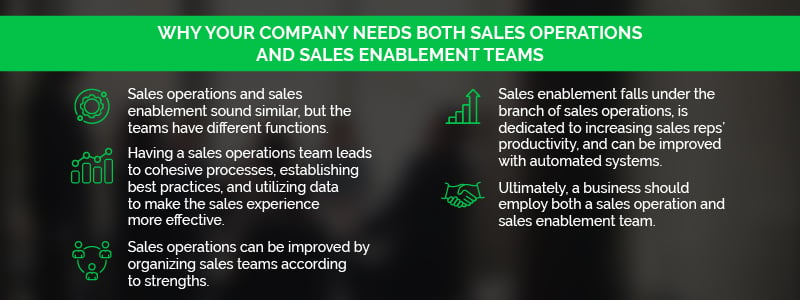Why Your Company Needs Both Sales Operations and Sales Enablement Teams

Sales operations and sales enablement might sound like they’re the same, but these teams have different functions. Here’s why you should have both for your company.

Every founder wants to maximize growth with minimal investment, and that may mean founder-led selling during startup. This is not a sustainable growth plan, however. Growing your business will inevitably lead to needing to expand your operations and staff.
It makes sense to bring on a sales team when you’re ready for growth, but even the best salespeople fail to hit quotas without proper resources and support. Many founders thus provide their sales teams with the assistance of sales operations and sales enablement teams. Some make the mistake of employing just one – a sales operations team or a sales enablement team – thinking the names sound similar and that the job functions must be as well.
There’s a difference between sales operations and sales enablement, though. Here’s why you should actually have both working for you.
Sales operations vs. sales enablement
Sales operations include the systems in place to facilitate selling, or the person or team responsible for creating sustainable growth within your business. Having this team leads to cohesive sales processes, and establishing best practices, which make the sales experience more effective and increases sales.
A few examples of sales operations activities include:
- Sales team organization
- Sales forecasting
- Helping sales teams to find new leads
- Creating and implementing sales systems
- Refining the sales funnel using data-driven information
Sales enablement, on the other hand, actually falls under the umbrella of sales operations. This team is dedicated to increasing sales reps’ productivity, providing reps and managers technology, tools, content, and reports to increase sales capacity and efficiency.
A few examples of sales enablement activities include:
- Creating opportunities for continued learning and training
- Improving sales communications
- Managing sales tools such as a CRM
- Reporting on the efficacy of sales strategies
The sales enablement team often reports to the sales operations team, executive managers, or a marketing department, and can have a large impact on operations. Sixty-five percent of sales leaders who exceeded their revenue targets in 2020 had a dedicated sales enablement team, according to recent research. In addition, more than half of the companies that were already utilizing these teams reported increasing their sales enablement budgets during the pandemic.
You need both teams to maximize your sales operations, however. Sales enablement focuses on how your sales team can better sell, while sales operations improves how you can do better business.
Improving sales operations
The sales operations team is responsible for creating the systems that run your business. This includes:
- Sales rep compensation plans and incentives
- Performance reviews
- Setting protocols to resolve poor performance
One way sales operations can improve is by conducting performance reviews to determine your sales personnel’s strengths and weaknesses. This information can be used to organize them according to strengths so your team works more efficiently.
Improving sales enablement
Statistics show that 57% of sales reps miss their quotas. Low productivity can drive such issues, but the first step is understanding what is getting in the way.
If sales reps aren’t producing, it may be because they’re tied up with other tasks. Recent studies have shown that salespeople spend just 35.9% of their time at work actually selling and the remainder on team meetings, writing emails, entering data, conducting lead research, and scheduling calls. If this is happening in your business, your sales enablement team can help reps hit or exceed their quotas by identifying which tasks can be automated and ensuring the right programs are created to do so.
Automation has a lot of business perks, too. HubSpot’s 2021 Sales Enablement Survey found more than half of overperforming sales leaders used CRMs to automate parts of their sales processes. Removing the busywork parts of the sales processes frees sales reps to focus on what they are there to do: sell.
Your business needs both
You truly do need both sales operations and sales enablement teams. Here’s an actual example of why this is beneficial:
- Your sales operations team uses data to determine your sales team is skimping at the beginning of the sales funnel. Your reps are failing to nurture warm leads, leading to low closing rates.
- Your sales enablement team then creates a training to address this issue and implements technology to help sales reps better nurture warm leads, ultimately leading to increased sales.
The roles are very different, and they work together to produce success. A clear division of labor is key here, as each team should have unique goals and deliverables and analyze unique metrics. Clear communication in periodic meetings can address any concerns about overlap or duplication of efforts.
How MetaGrowth Ventures helps build your sales processes
Building out your teams from scratch can be challenging, but taking a multi-step process will ensure you get top-tier talent every time. If you’re looking to add a sales operations and sales enablement team to your business, MetaGrowth Ventures is here to help. We put our decades of experience to work for you with our solutions-based sales consulting, and help you get massive growth with minimal investment.
If you’re ready to have an amazing team of top-performing sales professionals do your selling for you, contact us today. The MetaGrowth Ventures team can’t wait to help you ditch the daily grind of “founder selling” and focus on what matters: your scaling strategy.
Written by
Joe Arioto
